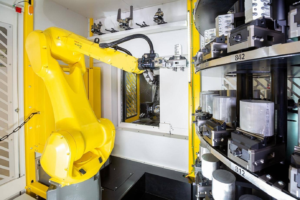
The landscape of industrial manufacturing is undergoing significant transformation, driven technological advancements, changing market demands, and a relentless pursuit of efficiency. To thrive in this evolving environment, manufacturers must embrace a range of essential services that enhance productivity and ensure competitiveness. This article explores key services, including CNC automation services and steelwork services, that are pivotal in shaping the future of industrial manufacturing.
CNC Automation Services: Enhancing Precision and Efficiency
Computer Numerical Control (CNC) automation services are revolutionizing the manufacturing sector enabling precise, repeatable, and efficient production processes. CNC technology utilizes computer software to control machine tools, allowing for the automated production of complex parts and components with minimal human intervention.
By integrating CNC Automation into manufacturing operations, companies can significantly reduce production times and costs. The precision offered CNC machines minimizes waste and rework, leading to higher quality products. Moreover, CNC systems can operate continuously, increasing throughput and enabling manufacturers to meet growing demands without compromising quality.
The adoption of CNC automation also facilitates the shift towards smart manufacturing, where interconnected systems communicate and collaborate in real-time. This integration of technology not only streamlines operations but also provides valuable data insights, allowing manufacturers to make informed decisions that enhance operational efficiency.
Steelwork Services: Building a Strong Foundation
Steelwork services are another critical component of modern manufacturing. The versatility and strength of steel make it an essential material in various applications, from construction to automotive manufacturing. Steelwork services encompass a range of activities, including fabrication, installation, and maintenance of steel structures.
With the increasing complexity of industrial projects, specialized steelwork services are crucial for ensuring structural integrity and safety. Advanced fabrication techniques, such as modular construction and prefabrication, allow for quicker assembly on-site and reduce labor costs. Additionally, skilled labor in steelwork services ensures that projects comply with regulatory standards and industry best practices.
Moreover, the push for sustainable practices in manufacturing has led to innovations in steel production, such as using recycled materials and adopting energy-efficient processes. By integrating sustainable steelwork services, manufacturers can reduce their environmental footprint while maintaining the high-performance standards required in industrial applications.
Robotics and Automation: Streamlining Operations
The integration of robotics and automation into manufacturing processes is another essential service driving industry evolution. Robotics enhances efficiency performing repetitive tasks with high precision and speed, allowing human workers to focus on more complex and value-added activities.
Collaborative robots, or cobots, are particularly beneficial in manufacturing environments, where they work alongside human operators to augment productivity. These systems can be easily programmed and adapted to various tasks, making them a flexible solution for manufacturers facing fluctuating demand.
Automation also contributes to enhanced safety in manufacturing facilities. By taking over hazardous tasks, robots reduce the risk of workplace injuries and accidents, fostering a safer work environment. As technology continues to advance, the capabilities of robotic systems will expand, offering manufacturers new ways to optimize their operations.
Additive Manufacturing: Redefining Production
Additive manufacturing, commonly known as 3D printing, is reshaping traditional manufacturing methods enabling the production of complex geometries and customized components. This technology allows manufacturers to create parts layer layer, significantly reducing material waste compared to subtractive manufacturing processes.
The ability to produce on-demand parts with additive manufacturing is particularly valuable in industries where rapid prototyping and customization are essential. Companies can quickly iterate designs and produce small batches of unique products without the need for extensive tooling or setup times.
As the technology matures, additive manufacturing is expected to play a more prominent role in supply chain optimization. By localizing production and reducing reliance on extensive inventory, manufacturers can respond more effectively to market demands while minimizing lead times and costs.
Digital Services: Enabling Smart Manufacturing
In the era of Industry 4.0, digital services are vital in enabling smart manufacturing environments. The integration of IoT (Internet of Things), big data analytics, and cloud computing allows manufacturers to collect and analyze vast amounts of data from their operations.
These digital services enhance decision-making processes providing real-time insights into production efficiency, equipment performance, and supply chain dynamics. Predictive maintenance, enabled data analytics, allows manufacturers to anticipate equipment failures and minimize downtime, leading to improved operational continuity.
Furthermore, digital services support enhanced collaboration among stakeholders in the manufacturing process, facilitating information sharing and communication across the supply chain. This interconnectedness fosters innovation and agility, allowing manufacturers to adapt to changing market conditions swiftly.
Conclusion
The future of industrial manufacturing is being shaped a range of essential services that drive efficiency, precision, and innovation. CNC automation services and steelwork services stand out as critical components in this evolution, while robotics, additive manufacturing, and digital services further enhance manufacturing capabilities.
By embracing these services, manufacturers can position themselves for success in an increasingly competitive landscape, ensuring they remain at the forefront of technological advancements and market demands. As the industry continues to evolve, the integration of these essential services will play a pivotal role in defining the next generation of manufacturing excellence.